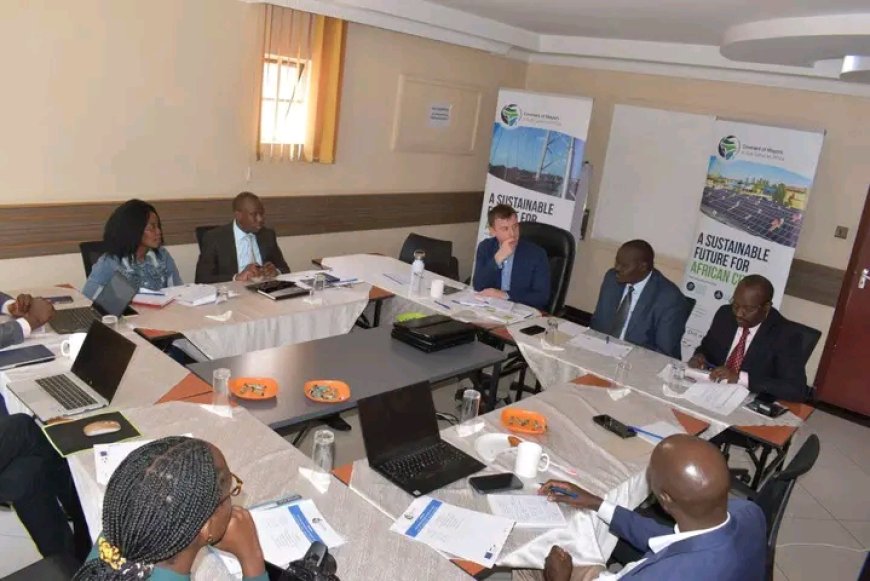Nakuru County allocates Sh 55 million towards climate resilience activities

NAKURU,
Wednesday September 6, 2023
KNA by Esther Mwangi
Nakuru County Government has set aside Sh 55 million to fund climate resilience and climate-smart Agricultural activities including small-scale irrigation and the adoption of drought-resilient seeds.
Chief Officer for Environment and Climate Change Kennedy Mungai said the County was crafting partnerships with waste recycling companies to invest in the county as a way of bolstering the circular economy not just because of its role in combating climate change by eliminating greenhouse gas emissions through waste management, but also because it has immense potential for income generation among communities.
Mungai further said the County administration had put in place a climate change action plan and dedicated 1.5 per cent of its development budget to climate adaptation and also undertaken a Participatory Climate Risk Assessment (PCRA) at the ward level.
“The measures in place were the key requirements to qualify for the Locally Led Climate Adaptation (FLLoCA) financing, being funded by the World Bank,” Mungai said in an interview with Kenya News Agency in his office.
The Chief Officer indicated that the County Government had activated committees to tackle effects of climate change in all the 55 electoral wards and developed proper governance structures and coordinated activities, including afforestation to enable building of resilience against negative effects of climate change.
While hailing the President for releasing Sh7.2 billion to counties to finance climate action initiatives, Mungai said the County Government was keen to promote the circular economy through partnerships with waste recycling companies.
He noted that the impact of Climate Change had made waste management a critical concern in growing urban centres. He extended an invitation to both local and foreign waste recycling companies to bring their circular economy solutions to Nakuru, assuring them of the County government's full support.
The National Environmental and Complaints Committee (NECC), in a report indicated that Nakuru County generates 250 tonnes of waste and only 45 per cent is collected.
Mungai stated that while garbage currently ends up in overstretched landfills and streets, choking up the environment, there was need for robust public-private partnerships that will help Counties realize zero waste as they make the circular economy a reality for Kenya.
The Chief Officer explained that landfills such as the Giotto dumpsite in Nakuru were among Kenya’s biggest source of methane, a greenhouse gas which he described as far more poisonous than carbon dioxide and a major contributor to global warming.
He explained that landfills emit methane when organic wastes such as food scraps, wood and paper decompose, adding that proper waste management through recycling would reduce methane.
Mungai said Carbon dioxide (CO2) and methane (CH4) traps heat in the Earth’s atmosphere, leading to rising temperatures and disruptive weather patterns adding that Greenhouse gas emissions acts like a blanket around the planet, trapping heat and causing the Earth’s temperature to rise.
“Cutting these emissions means reducing the amount of heat-trapping gases in the atmosphere, allowing the Earth to cool down over time. It’s like turning down the dial on a heater to prevent overheating,”said Mungai.
Mungai added hat the county administration was promoting transitioning to cleaner sources of energy and adopting sustainable land-use practices which are essential steps to reducing emissions adding that this not only benefits the climate but also helps create a more resilient and liveable planet for future generations.
“We cannot sit and wait for miracles. We must reject habits that kill our earth. We have to come together and make the world a better place. Climate action must be given priority because failure to address the crisis may plunge the earth in danger,” he observed.
The County government, he pledged, was committed to enhancing planning, budgeting and execution of allocated resources for climate action through actual investment in climate adaptation and mitigation by realigning resources within and across sectors to effectively address local needs and align with national priorities for effective service delivery.
Engineer Ndegwa Mahinda, a former supervisor with Los Angeles Sanitation Districts Agency, suggested that both levels of government should come up with legislations and policies that promote use of recycled water for construction and industrial purposes even as climate change and drought cause water shortages in many parts of the country.
He said County Governments should remain alive to the fact that as Kenya’s population grows and living standards improve increasing volumes of waste water effluent are being discharged untreated into the environment causing major health and pollution threats and further reducing the amount of available water for drinking and agriculture.
More than 80 percent of the world's wastewater is dumped in the environment without treatment, especially in poor countries, according to a recent United Nations report that called wastewater the ‘untapped resource’.
“The world is going green and we have to follow suit because even if we do not embrace technology, it will catch up with us eventually,” said Mahinda.
Mahinda stated that County Governments need to put in place a system that recycles water and sewage into clean usable water that could be used for the outdoors, car washing, gardening, and toilet flushing.
He said that it was time Kenya looked at water recycling on a large scale as a viable option to tackle the water problem in the country, adding that policies that promote use of recycled water in agriculture would go a long way in ensuring water was kept in the social system for as long as possible.
Mahinda said that both levels of government should consider policies that create irrigated agriculture zones next to centralized sewage treatment works that would use recycled water and be run under strict guidelines.
Courtesy; KNA
What's Your Reaction?































































































































































































































































































